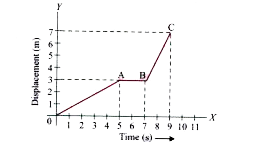Complete Solutions to MANDATORY EXERCISE (EXERCISE SET - II) of chapter DESCRIPTION OF MOTION of Class 9 book with complete answers and questions
| Class 9 | PHYSICS |
| Chapter | DESCRIPTION OF MOTION |
| CENGAGE PHYSICS | MANDATORY EXERCISE (EXERCISE SET - II) |
| Number Of Questions | 7 |
| Academic Year | 2023-24 |
Give an example of motion with
(i) acceleration `a = 0` and velocity `v != 0`
(ii) displacement = 0 and distance travelled = 0
View SolutionIs it possible to have (i) `v = 0` and `a != 0`? (ii) distance travelled=0 but displacement `!= 0`? If yes, give an example for each.
View SolutionIf the displacement-time graph of a body is a straight line parallel to the time axis, what is the nature of motion of the body?
View SolutionWhat does the slope of a displacement-tine graph represent? Can displacement-time graph be parallel to the displacement axis? Give reason for your answer.
View SolutionThe position-time (x-t) graphs for two children A and B returning from their school O to their homes P and Q, respectively, are shown in figure. P Choose the correct answer.

(i) A and B reach home at the (same/different) time.
(ii) A or B overtakes on the road (once/twice).
View SolutionThe following table represents the position of a car with time in a fixed direction.

Plot displacement-time graph and find graphically
(i) the velocity of the car
(ii) the displacement of the car at 3.5 s and 4.5 s
View SolutionIn the figure, the displacement of a body is shown at different instants of time.
(i) Calculate the velocity of the body as it moves for (a) 0s to 5 s, (b) 5 s to 7 s, and (c) 7 s to 9 s.
(ii) Also, calculate the average velocity during the time interval 7 s to 9 s.

View Solution
MANDATORY EXERCISE (EXERCISE SET - II) questions and complete solutions for chapter DESCRIPTION OF MOTION of CENGAGE PHYSICS of Class 9
All Exercises from CENGAGE PHYSICS Class 9 PHYSICS DESCRIPTION OF MOTION
- CHALLENGING EXERCISE
- CONSOLIDATED EXERCISE (COMPREHENSION)
- CONSOLIDATED EXERCISE (MATCH THE COLUMNS)
- CONSOLIDATED EXERCISE (MULTIPLE-CHOICE QUESTIONS WITH ONE CORRECT ANSWER)
- CONSOLIDATED EXERCISE (MULTIPLE-CHOICE QUESTIONS WITH ONE OR MORE THAN ONE CORRECT ANSWER)
- MANDATORY EXERCISE (EXERCISE SET - I)
- MANDATORY EXERCISE (EXERCISE SET - II)
- MANDATORY EXERCISE (EXERCISE SET - III)
- OLYMPIAD AND NTSE LEVEL EXERCISE
- WORKED EXAMPLES